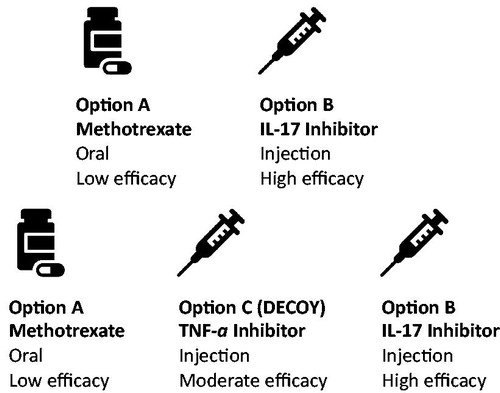Biologic medications have revolutionized the treatment of moderate-to-severe psoriasis. However, many patients prefer oral medications over biologics, which are administered via injection, despite the fact that biologics have higher efficacy. It can be difficult to help a patient choose the best medication, especially when there are so many options available.
Human choices are affected by the context in which the options are presented. The decoy effect is a marketing strategy for swaying consumers in a particular direction. In the decoy effect, the introduction of an inferior option (a decoy) into a choice set can make one of the original options (the target) more attractive than the other original option (the competitor) (Citation1). As an example, consider two options, option A, a modestly effective oral medication, and option B, a highly effective injectable. Patients may have a difficult choice to make between them, unsure if greater efficacy outweighs oral drug delivery. The decoy effect entails offering a third option, for example an injectable with efficacy between that of option A and option B. While it is still unclear whether this third option is better or worse than option A (as there is still a tradeoff between greater efficacy and oral administration), option B is clearly preferable to the decoy, as they are both given by injection and option B has greater efficacy (). Therefore, even though option C would not be expected to ever be chosen (as it is clearly less desirable than option B), its presence can be expected to impact the way in which patients choose between the remaining two options.
Figure 1. Decoy Effect
With a difficult decision between Option A and Option B, Option C acts as a decoy and shifts the choice to Option B

The decoy effect has been replicated in a wide variety of choice situations involving not only commercial products and marketing, but also jobs and political candidates (Citation2–4). For a practical application, the decoy effect was tested as a means to improve hand hygiene in the workplace (Citation5). At baseline, workers in a food factory were expected to sanitize their hands every hour utilizing spray bottles, but hand hygiene compliance was only about 60%. The workers had two choices – use the sanitizing spray provided or not to sanitize their hands; the study provided a third option, a less convenient hand sanitation method. In providing a sanitation option that was less convenient (the decoy), hand hygiene compliance in the food factory increased to over 90%.
Physicians may be able to harness the decoy effect in helping patients make better medication choices. This strategy may be particularly useful in patients who are having difficulty deciding between an oral medication and a biologic. When patients have trouble making a choice among multiple disparate options, utilizing the decoy effect may help physicians guide patients to the treatment the physician believes is most appropriate.
Center for Dermatology Research, Department of Dermatology, Wake Forest School of Medicine, Winston-Salem, North Carolina
Department of Pathology, Wake Forest School of Medicine, Winston-Salem, North Carolina
Department of Social Sciences & Health Policy, Wake Forest School of Medicine, Winston-Salem, North Carolina
[email protected]
Disclosure statement
Feldman has received research, speaking and/or consulting support from a variety of companies including Galderma, GSK/Stiefel, Almirall, Leo Pharma, Boehringer Ingelheim, Mylan, Celgene, Pfizer, Valeant, Abbvie, Samsung, Janssen, Lilly, Menlo, Merck, Novartis, Regeneron, Sanofi, Novan, Qurient, National Biological Corporation, Caremark, Advance Medical, Sun Pharma, Suncare Research, Informa, UpToDate and National Psoriasis Foundation. He is founder and majority owner of www.DrScore.com and founder and part owner of Causa Research, a company dedicated to enhancing patients’ adherence to treatment.
Patrick Whitman and Abigail Cline have no conflicts to disclose.
References
- Huber J, Payne JW, Puto C. Adding Asymmetrically Dominated Alternatives: Violations of Regularity and the Similarity Hypothesis. J Consum Res. 1982;9(1):90–98.
- Josiam BM, Hobson JSP. Consumer Choice in Context: The Decoy Effect in Travel and Tourism. J Travel Res. 1995;34(1):45–50.
- Slaughter JE, Kausel EE, Quiñones MA. The decoy effect as a covert influence tactic. J Behav Decis Mak. 2011;24(3):249–266.
- O'Curry YP, Pitts R. The Attraction Effect and Political Choice in Two Elections. J Consum Psychol. 1995;4(1):85–101.
- Li M, Sun Y, Chen H. The Decoy Effect as a Nudge: Boosting Hand Hygiene with a Worse Option. Psychol Sci. 2018;30(1):139–149.
